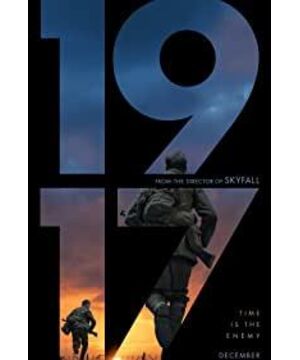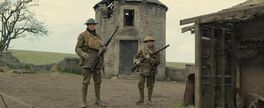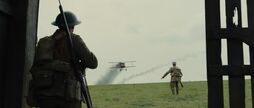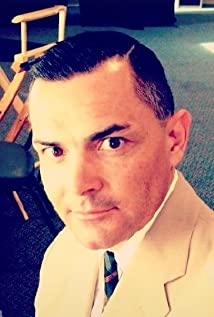There were relatively few films on World War I, and it was difficult to shoot long shots. Anti-war films had a worldwide significance. All these made up the awards season of "1917".
The film not only tells the story that happened on the battlefield, but also presents complex thinking.
Blake and Schofield's discussion about the usefulness of the combat medal challenged existing values and traced the essence of human nature. Is it important to live or to honor? Especially when the war itself is absurd.
Blake's behavior towards enemy pilots is human nature, save lives first, no matter what. It's just that on the battlefield, being kind to the enemy is cruel to himself, Blake also gave his life in order to stick to his nature.
Schofield discussed with Blake from the beginning to send the letter later. It was not afraid, but rational and thoughtful. This is because he always walked in the front on the grounds of his old age. Rules can be seen.
The officer who ran into him on the way told Schofield to have someone beside him when he spread the letter, because "some people just want to fight." I thought some people were warlike.
But when Schofield finished sending the letter, he heard a passage from the officer and felt the complexity of the war deeply. If we don’t fight today, we will fight tomorrow. "The only way to end the war is to fight until the last breath." When people are gone, the war will no longer exist. It is a kind of extreme despair.
No one wanted to fight. Among the British soldiers we saw, for example, the central defender who sent them out in the first place complained about "how long will they be guarded"; the soldiers who happened to meet in the car commented on the cruelty and innocence of the war. Significance; finally at the front line, the soldiers sang songs about wanting to go home.
Including Schofield's anger at Blake after he was nearly killed by a landmine: "Why are you calling me here?" In fact, Blake thought he was asking him to take someone home with him, or to give them food. Such a "good thing" must be called your best friend.
This is true for British soldiers, and so are German soldiers. In the underground lounge built by the German army, there is also a photo on the head of a bed.
Moreover, the photo was not taken, which means that the soldier may have died in battle.
At the beginning, Blake said that his vacation next week was cancelled, but Schofield said it would be nice not to go home.
Later, I realized that Schofield said that because every time he went home, he still had to return to the battlefield, but he didn't know if it was a departure or a goodbye.
The ending is the same as the opening, green grass, blue sky, a big tree, and a touch of wind.
It's just that the good friends who slept with are gone.
What if all this is just a dream?
Sleep again, wake up again, can everything come back again?
The task is finally completed, and the film is about to end. What has happened has become a story and a movie.
The long shot, and the sound of the cello, are so melodious and sad.
View more about 1917 reviews











